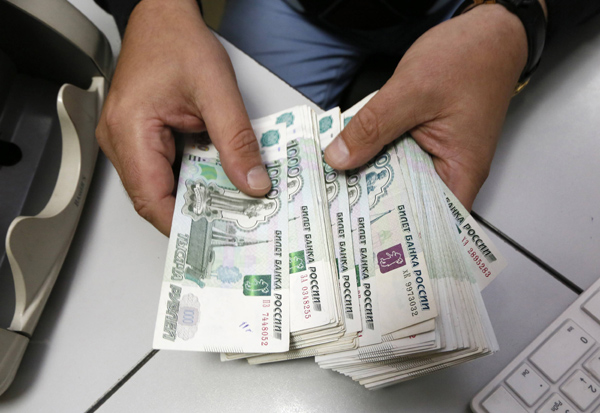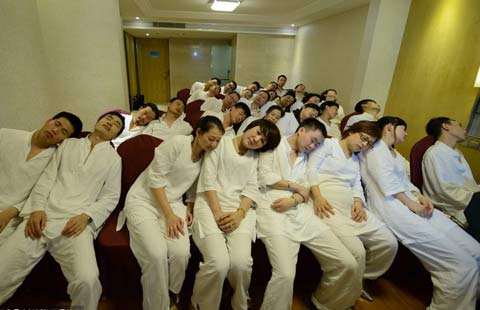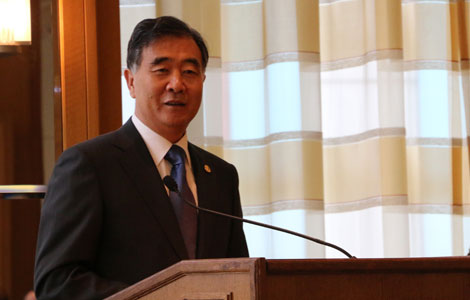Russians flock to stores to pre-empt price rises
Updated: 2014-12-18 08:47
(Agencies)
|
||||||||
 |
|
An employee counts Russian ruble banknotes at a private company's office in Krasnoyarsk, Siberia, December 17, 2014. [Photo/Agencies] |
MOSCOW - Russian consumers flocked to the stores Wednesday, frantically buying a range of big-ticket items to pre-empt the price rises kicked off by the staggering fall in the value of the ruble in recent days.
As the Russian authorities announced a series of measures to ease the pressure on the ruble, which slid 15 percent in the previous two days and raised fears of a bank run, many Russians were buying cars and home appliances - in some cases in record numbers - before prices for these imported goods shoot higher.
The Swedish furniture giant IKEA already warned Russian consumers that its prices will rise Thursday, which resulted in weekend-like crowds at a Moscow store on a Wednesday afternoon.
Shops selling a broad range of items were reporting record sales - some have even suspended operations, unsure of how far the ruble will sink. Apple, for one, has halted all online sales in Russia.
"What's pressuring us is the fact that many people (back then) rushed to withdraw money from bank cards, accounts," says Alyona Korsuntseva, a shopper at IKEA in her 30s.
Consumers are buying durable goods as they are seen as better investments than most Russian stocks. And, an overwhelming majority of Russians cannot afford to buy land or real estate.
Earlier this week, the ruble suffered catastrophic losses as traders continued to fret over the combined impact of low oil prices and Western sanctions over Russia's involvement in Ukraine's crisis.
Some signs emerged Wednesday that the ruble's freefall may have come to an end and the currency could recover, at least in the short-term. After posting fresh losses early Wednesday, the ruble rallied more than 10 percent to around 60 per dollar at 9 pm Moscow time (1800 GMT).
Analysts credited a series of reassuring statements from the Central Bank and the government for the improving ruble backdrop.
First, Deputy Finance Minister Alexei Moiseyev said the government will sell foreign currency from its own reserves "as much as necessary and as long as necessary."
Then the Central Bank announced an expanded series of measures to help calm the situation such as giving banks more freedom to increase interest rates on retail deposits and offering them more flexibility to deal with the ruble's depreciation on their balance sheets.
Neil Shearing, chief emerging markets economist at London-based Capital Economics, said the "authorities have at last started to develop a strategy for containing the effects of the ruble's collapse on the banking system and wider economy."
Tom Levinson, chief foreign exchange and rates strategist at Sberbank CIB, agreed, saying the Central Bank could ease pressure on the ruble, even without massively spending its reserves.
"If they can provide measures that help secure the banking sector, provide confidence to investors and also to the population as a whole ... that could be the first toward stabilizing the situation," Levinson said in an interview. "Long way to go, but we are seeing some positive steps at last."
The ruble's tailspin continued Tuesday, despite a move by Russia's Central Bank to raise its benchmark interest rate to 17 percent from 10.5 percent - a move aimed to make it more attractive for currency traders to hold onto their rubles.
Should the current attempts to shore up the ruble fail, then the Russian authorities could be imposing capital controls.
However, Russia's Economic Development Minister Alexei Ulyukayev has denied the government is considering doing so.
Russian officials, meanwhile, have sought to project a message of confidence on state television, dwelling on the advantages of ruble devaluation, such as a boost to domestic manufacturing.There are fears that the ruble could come under further pressure this week as President Barack Obama is expected to sign legislation authorizing new economic sanctions against Russia.
Whatever happens with the ruble, the Russian economy is set to shrink next year by 0.8 percent, even if oil prices stay above $80 per barrel. If oil prices stay at the current level of around $60, the Central Bank said the Russian economy could contract by nearly 5 percent.
The German government's coordinator for relations with Russia, Gernot Erler, said the economic crisis in Russia was largely the result of the drop in oil prices.

 China's 10 major economic policies in 2014
China's 10 major economic policies in 2014
 Beeper collector brings back the vintage digital age
Beeper collector brings back the vintage digital age
 10 bad behaviors of Chinese drivers
10 bad behaviors of Chinese drivers
 Yearender: Honors achieved in 2014
Yearender: Honors achieved in 2014
 Surprising techniques to relieve stress
Surprising techniques to relieve stress
 Yearend Review 2014 -Best of Animals
Yearend Review 2014 -Best of Animals
 Premier: In between the meetings
Premier: In between the meetings
 Chinese VP speaks at food cooperation forum in Chicago
Chinese VP speaks at food cooperation forum in Chicago
Most Viewed
Editor's Picks

|

|

|

|

|

|
Today's Top News
New dynamic as US, Cuba restore relations
China set to make tracks for Europe
US moves to normalize relations with Cuba
Russians flock to stores to pre-empt price rises
New York premiere of DPRK comedy canceled after threat
Wal-Mart bullish over Sam's Club
Beijing hotel recognized for excellence
Li makes pitch for business investment
US Weekly

|

|








